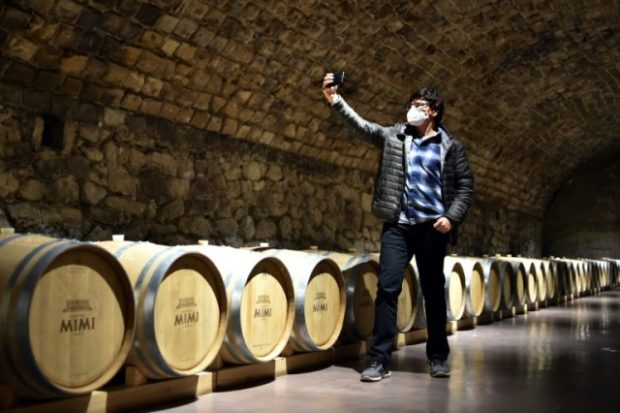
A long-established wine industry has been one of Moldova’s few bright spots but it has been hit hard by virus restrictions. Image: AFP/SERGEI GAPON.
The vast underground cellars of Moldova’s Cricova winery used to echo with the sounds of hundreds of visitors. Now, just a handful of guests wander past the huge barrels and endless rows of bottles holding its vintages.
“We used to have 300 to 450 people a day but with the pandemic… there are days when there are literally 15 people,” winery tour guide Vita Viznyuk told AFP in the cellars, her face covered by a black mask.
Impoverished Moldova, a tiny country wedged between Romania and Ukraine, has struggled to build a solid economy since gaining independence with the 1991 collapse of the Soviet Union.
One of the few bright spots has been its long-established wine industry, well-known in eastern Europe with significant exports to Russia, Romania, Poland and other countries.
Vineyards have been trying for a decade to expand their business into tourism, offering wine tours and wine-themed resorts.
They were making some headway, but the pandemic has halted progress in its tracks.
In 2018, the country of only 3.5 million people welcomed 1.5 million foreign tourists — and almost half of them came to Moldova specifically for wine tours, Kristina Frolov, the head of Moldova’s National Office of Vine and Wine, told AFP.
Most came from Romania and Ukraine, but also from Russia and Germany, she said.
Barely larger than Belgium, the country has some 110,000 hectares (270,000 acres) of vines and has ranked in recent years as the world’s 20th-largest wine producer.
World’s biggest wine cellar
The Cricova winery alone produces 11 million bottles per year of red, white and rose and is best known for its sparkling wines.
Its cellars contain bottles that belonged to Nazi leader Hermann Goering and were seized by Red Army troops in World War II as well as collections awarded to visiting world leaders such as Russian President Vladimir Putin, who celebrated his 50th birthday in Cricova.
At his vineyard not far away in the village of Cojusna, Georgy Cissa, 75, has spent 53 years in the business.
“Half of the people in Moldova are winemakers,” said Cissa, whose bottles feature a label showing his winemaker grandfather with a glass of wine in hand.
About 30 kilometers (20 miles) from Cricova, Milestii Mici is an old lime mine that is now the biggest wine cellar in the world, its tunnels running for some 200 kilometers (125 miles).
Its collection of 1.5 million bottles is recognized by Guinness World Records as the world’s biggest.
The COVID-19 pandemic has hit the industry’s core business, with Moldovan wine sales falling by between 10 to 30%, Frolov said.
But it’s the fall in wine tourism that has hit the industry hardest.
Stays in Moldovan tourism establishments were down 78% in the first nine months of the year, compared to 2019, according to the state statistics service.
‘Waiting for the vaccine’
The elegant Castel Mimi Wine Resort, founded in the 19th century, has lost 70% of its tourist flow and is trying to find creative ways to stay afloat.
Now, visitors can participate in designing labels, attend wine blending workshops, or even try wine spa treatments.
The company also relaunched production of spirits to meet a growing demand for alcohol disinfectants, employing waiters after its restaurant was closed for four months of lockdown.
These efforts made it possible to “at least pay salaries and maintain the complex,” Olga Ovchinnikova, a Castel Mimi manager, told AFP.
Like everyone else, she said, “we are waiting for the vaccine.”
Frolov is optimistic and believes Moldovan wine tourism has “a good chance” of recovering quickly.
With 65% of the country’s tourists coming from neighboring countries, she said she expects visitors will return for short stays “as soon as the borders open.” CC
RELATED STORIES:
Damascus fair offers hope for exports-starved Aleppo artisans
Hay beds and highway kitchens: Indian farmers dig in for reform protests